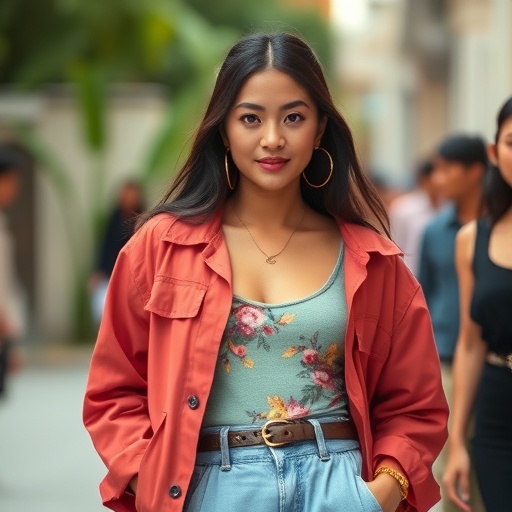The rise of sustainability in fashion has created a wave of social consciousness that reverberates through emerging markets. An intriguing study conducted by Londoño-Bedoya, Lechuga-Cardozo, Areiza-Padilla, and their colleagues has unlocked a critical perspective on how trust in social media influencers can significantly drive the adoption of sustainable fashion choices among consumers in these regions. As the global fashion industry grapples with its environmental impact, this research provides a vital lens through which to understand consumer behavior in the context of emerging economies.
The pivotal role of influencers cannot be overstated, especially in markets where traditional advertising holds less sway. Often, the perceived authenticity of influencers offers a powerful alternative to conventional marketing tactics, which are increasingly viewed with skepticism. Trust in these digital personalities serves as the bedrock of their influence, propelling their followers to consider and ultimately embrace sustainable fashion options. By understanding this dynamic, brands seeking to establish a foothold in emerging markets can better tailor their strategies to align with the values and preferences of their target audience.
Within this framework, the research highlights how influencers curate messages that emphasize not only fashion choices but also ethical consumption. The language they use, the values they project, and the communities they build around sustainable fashion can engage audiences in ways that resonate deeply with their lived experiences. This connection is imperative in emerging markets, where consumers often navigate socio-economic challenges that influence their purchasing habits.
The findings delineated in the study suggest that the perceived integrity and relatability of influencers create a virtuous cycle of trust and engagement. As consumers begin to align their identities with influencers who advocate for sustainability, a powerful communal shift occurs, driving sustainable practices even further into the mainstream. This phenomenon illustrates the fundamental shift in how individuals relate to consumption, now framed within the context of global responsibility and personal identity.
While the mechanics of influencer marketing are widely recognized, its intersection with environmental consciousness presents a nuanced challenge. In regions where fashion holds significant cultural importance, aligning sustainability with traditional values can be a delicate endeavor. The research underscores the necessity for influencers to approach their narratives with cultural sensitivity, ensuring that their messages resonate authentically with diverse audiences.
Moreover, the study emphasizes the need for influencers to remain transparent and committed to sustainable practices themselves. As they promote brands and products, the authenticity of their endorsements hinges on their alignment with genuine sustainable principles. A misalignment could lead to backlash, as consumers increasingly demand accountability from public figures in an era where ethical standards are paramount.
The implications of this research stretch beyond academia, offering actionable insights for brands keen to leverage the influence of social media figures. Fashion brands aiming to penetrate emerging markets must develop partnerships with influencers who embody the values of sustainability and social equity. By doing so, they can harness the influencer’s relationship with their audience to create a deeper, more impactful narrative that champions sustainable fashion.
In addition to fostering deeper consumer relationships, these collaborations create a platform for education about sustainable practices. Influencers have the potential to act as conduits for information, sharing insights on not only the benefits of sustainable fashion but also practical ways to make conscious consumer choices. This educational role is crucial in markets where awareness of environmental issues and sustainable practices may still be developing.
As consumers increasingly prioritize sustainability in their fashion choices, the onus is on both influencers and brands to evolve. The study suggests that staying ahead of trends and fostering a community around sustainable values can yield long-term loyalty from consumers. Influencers, therefore, are positioned not just as marketers, but as change agents who can reshape consumer norms and expectations.
For the fashion industry at large, incorporating influencer partnerships into broader sustainability initiatives can catalyze systemic change. By amplifying voices that advocate for environmentally responsible practices, the entire industry can shift toward a more sustainable future. The cross-disciplinary nature of this approach—merging marketing, sociology, and environmental studies—highlights the multifaceted solutions required to tackle the complexities of the fashion industry’s environmental impact.
This research ultimately paints an optimistic picture of the future of fashion in emerging markets, driven by trust in influencers and a collective desire for sustainable living. As brands and consumers alike strive for a more sustainable future, the lessons gleaned from this study serve as a guiding framework. Genuine efforts toward ethical consumption and production will not only foster consumer loyalty but also contribute to the preservation of the planet for future generations.
In summary, the intersection of influencer marketing and sustainable fashion represents a powerful frontier in consumer engagement in emerging markets. Through an authentic connection based on trust, influencers can indeed spark a movement that promotes ethical consumption. This dynamic reinforces the notion that personal values, when aligned with collective consciousness, can drive significant change in the contemporary fashion landscape.
In closing, as we continue to navigate discussions around fashion and sustainability, the implications of these findings remind us that our choices extend beyond individual purchases—they reflect our values, communities, and aspirations as a society. By championing sustainable practices and leveraging the power of trust, we can pave the way for a brighter, more responsible future in fashion.
Subject of Research:
Trust in influencers and sustainable fashion adoption in emerging markets.
Article Title:
Trust in influencers increases sustainable fashion adoption in emerging markets.
Article References:
Londoño-Bedoya, D.A., Lechuga-Cardozo, J.I., Areiza-Padilla, J.A. et al. Trust in influencers increases sustainable fashion adoption in emerging markets. Discover Sustain 6, 1289 (2025). https://doi.org/10.1007/s43621-025-01816-3
Image Credits:
AI Generated
DOI:
https://doi.org/10.1007/s43621-025-01816-3
Keywords:
sustainable fashion, influencers, consumer behavior, emerging markets, trust, ethical consumption, marketing.




